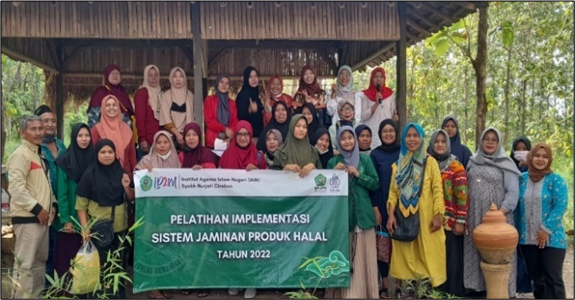Implementation halal product certification through self-declare program for MSEs products in Cirebon Regency
DOI:
https://doi.org/10.22219/jcse.v4i2.25058Keywords:
Halal Product Assurance System, Halal product, Halal certificate, Micro and Small Enterprises (MSEs), CirebonAbstract
Cirebon is one of the regions of West Java which has around 54,306 MSMEs. However, currently, there are still many MSEs actors who don't understand the urgency of halal certification and incomprehensible how to apply for a halal certificate for their products. This community service activity aims to socialize and assist in applying for halal product certification for MSEs through the self-declaration program. The research method is Community Education through training and counselling conducted in the Pasaleman and Beber area with the category of food and beverage products. The data were used descriptive analysis. The results show that the mentoring participants gave a positive response to these activities, and MSEs received assistance in the practice of submitting halal products to the SIHALAL application. Some MSEs actors were able to apply for halal certification with the verification application status completed by National Fatwa Committee, LP3H, some were still in the draft submission and some had not yet submitted because business actors were more focused on product sales, so the time to complete the submission documents was limited. Furthermore, the community service team evaluates activities and monitors tracking periodically after submitting halal certification until release certificate halal product.
Downloads
References
Abdullah, M. (2018). Waqf, Sustainable Development Goals (SDGs) and Maqasid al-Shariah. International Journal of Social Economics, 45(1), 158–172. https://doi.org/10.1108/IJSE-10-2016-0295
Arieftiara, D., Nawir, J., & Julianisa, I. A. (2022). Halal Food certification, financial performance, and sustainability reporting: Comparative Study of food and beverage firms in Malaysia and Indonesia. AgBioForum, 24(2), 12–22. https://agbioforum.org/menuscript/index.php/agb/article/view/120/71
Azam, M. S. E., Abdullah, M. A., & Razak, D. A. (2019). Halal tourism: Definition, justification, and scopes towards sustainable development. International Journal of Business, Economics and Law, 18(3), 23–31. https://www.ijbel.com/wp-content/uploads/2019/05/KLIBEL-18_64.pdf
Bashir, A. M. (2019). Effect of halal awareness, halal logo and attitude on foreign consumers’ purchase intention. British Food Journal, 121(9), 1998–2015. https://doi.org/10.1108/BFJ-01-2019-0011
Chairunnisyah, S. (2017). Peran Majelis ulama indonesia dalam menerbitkan sertifikat halal pada produk makanan dan kosmetika. EduTech: Jurnal Ilmu Pendidikan Dan Ilmu Sosial, 3(2), 10–27. https://doi.org/10.30596/et.v3i2.1251
Dhahri, S., & Omri, A. (2018). Entrepreneurship contribution to the three pillars of sustainable development: What does the evidence really say? World Development, 106(84504), 64–77. https://doi.org/10.1016/j.worlddev.2018.01.008
Djakfar, I., & Isnaliana, I. (2021). Model Pendampingan pengurusan sertifikasi produk makanan halal bagi umkm dalam mendukung Banda Aceh menjadi kota wisata halal. Wikrama Parahita: Jurnal Pengabdian Masyarakat, 5(1), 80–88. https://doi.org/10.30656/jpmwp.v5i1.2742
Fathoni, M. A., & Syahputri, T. H. (2020). Potret industri halal Indonesia : Peluang dan tantangan. Jurnal Ilmiah Ekonomi Islam, 6(03), 428–435. https://doi.org/http://dx.doi.org/10.29040/jiei.v6i3.1146
Gunawan, S., Darmawan, R., Juwari, J., Qadariyah, L., Wirawasista, H., Firmansyah, A. R., Hikam, M. A., Purwaningsih, I., & Ardhilla, M. F. (2020). Pendampingan produk UMKM di Sukolilo menuju sertifikasi halalan thayyiban. SEGAWATI, Jurnal Pengabdian Kepada Masyarakat, 4(1), 14. https://doi.org/10.12962/j26139960.v4i1.6446
Hikmatul, H. (2022). Industri halal sebagai system pendukung sustainable development goals di era society 5.0. Tabur, L A N Syari, Jurnal Ekonomi, 4(1), 43–59. http://ejournal.kopertais4.or.id/tapalkuda/index.php/lantabur/article/download/4768/3392/
Idris, P. S. R. P. H., Musa, S. F. P. D., & Sumardi, W. H. H. (2022). Halal-tayyiban and sustainable development goals: A SWOT analysis. International Journal of Asian Business and Information Management, 13(2), 1–16. https://doi.org/10.4018/IJABIM.20220701.oa9
Ismail, W. R. B. W., Othman, M., Rahman, R. A., Kamarulzaman, N. H., & Rahman, S. A. (2016). Halal Malaysia logo or brand: The hidden gap. Procedia Economics and Finance, 37(16), 254–261. https://doi.org/10.1016/s2212-5671(16)30122-8
Malecki, E. J. (2018). Entrepreneurship and entrepreneurial ecosystems. Geography Compass, 12(3), 1–21. https://doi.org/10.1111/gec3.12359
Moerad, S. K., Pingit, S., Mutiah, W., Chamid, S., & Dian, E. (2022). Sosialisasi serta pendampingan sertifikasi halal UMKM di Kabupaten Sidoarjo. SEGAWATI, Jurnal Pengabdian Kepada Masyarakat, 6(6), 1–15. https://doi.org/10.12962/j26139960.v7i1.118
Morelli, N. (2015). Challenges in designing and scaling up community services. The Design Journal, 18(2), 269–290. https://doi.org/doi.org/10.2752/175630615X14212498964394
Nur, S. K., & Istikomah, I. (2021). Progam SEHATI: Kemudahan pelaksanaan sertifikasi halal bagi UMKM. At-Tasharruf “Jurnal Kajian Ekonomi Dan Bisnis Syariah,” 3(2), 72–79. https://doi.org/10.32528/at.v3i2.6780
Pardiansyah, E., Abduh, M., & Najmudin. (2022). Sosialisasi dan pendampingan sertifikasi halal gratis ( sehati ) dengan skema self-declare bagi pelaku usaha mikro di Desa Domas. Jurnal Pengabdian Dan Pengembangan Masyarakat Indonesia, 1(2), 101–110. https://doi.org/10.56303/jppmi.v1i2.39
Rachmawati, E., Suliyanto, & Suroso, A. (2022). A moderating role of halal brand awareness to purchase decision making. Journal of Islamic Marketing, 13(2), 542–563. https://doi.org/10.1108/JIMA-05-2020-0145
Rezai, G., Mohamed, Z., & Shamsudin, M. N. (2012). Non-Muslim consumers’ understanding of Halal principles in Malaysia. Journal of Islamic Marketing, 3(1), 35–46. https://doi.org/10.1108/17590831211206572
Salaheldeen, M., Battour, M., & Azrin Nazri, M. (2019). Halal entrepreneurship and its role in sustainable development goals 2030 (SDGs) Non-muslim perception towards Halal Tourism View project. 2030(June 2021). https://www.researchgate.net/publication/337292381
Salleh, M. M., & Harun, E. H. (2022). Halal Food supply chain ( Hfsc ) and sustainability concept. Journal of Islamic, Social, Economics and Development (JISED), 7, 26–34. https://doi.org/10.55573/JISED.074903
Sekarwati, E., & Hidayah, M. (2022). Pendampingan dan sosialisasi pendaftaran sertifikasi halal menggunakan aplikasi sihalal bagi pelaku UMKM Kabupaten Purworejo. Jurnal Pengabdian Masyarakat Intimas (Jurnal INTIMAS): Inovasi Teknologi Informasi Dan Komputer Untuk Masyarakat, 2(2), 84–89. https://doi.org/10.35315/intimas.v2i2.9010
Trimulato, Syarifuddin, Hafsah Umar, S., & Lorenza, P. (2022). The Role Halal Industry to Support Sustainable Development Goals (SDGs). Proceedings 4Th International Aciel, 1–13. https://www.aciel.trunojoyo.ac.id
Ulfin, I., Rahadiantino, L., Harmami, H., Ni’mah, Y. L., & Juwono, H. (2022). Sosialisasi halal dan pendampingan sertifikasi halal untuk UMKM Kelurahan Simokerto. SEGAWATI, Jurnal Pengabdian Kepada Masyarakat, 6(1), 10–17. https://doi.org/10.12962/j26139960.v5i3.26
Wahyuni, H. C., Handayani, P., & Wulandari, T. (2022). Pendampingan sertifikasi halal meningkatkan daya saing produk UMKM. To Maega: Jurnal Pengabdian Masyarakat, 6(1), 17–25. https://doi.org/10.35914/tomaega.v6i1.1271
Youssef, B. A., Boubaker, S., & Omri, A. (2018). Entrepreneurship and sustainability: The need for innovative and institutional solutions. Technological Forecasting and Social Change, 129(84503), 232–241. https://doi.org/10.1016/j.techfore.2017.11.003

Downloads
Published
How to Cite
Issue
Section
License
Copyright (c) 2023 Muhimatul Umami, Shofwatun Nada, Nur Lulu Anisa

This work is licensed under a Creative Commons Attribution-ShareAlike 4.0 International License.












